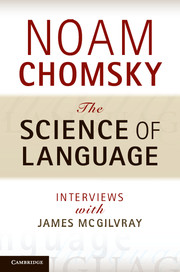Book contents
- Frontmatter
- Contents
- Introduction
- Part I The science of language and mind
- 1 Language, function, communication: language and the use of language
- 2 On a formal theory of language and its accommodation to biology; the distinctive nature of human concepts
- 3 Representation and computation
- 4 More on human concepts
- 5 Reflections on the study of language
- 6 Parameters, canalization, innateness, Universal Grammar
- 7 Development, master/control genes, etc.
- 8 Perfection and design (interview 20 January 2009)
- 9 Universal Grammar and simplicity
- 10 On the intellectual ailments of some scientists
- 11 The place of language in the mind
- 12 Chomsky's intellectual contributions
- 13 Simplicity and its role in Chomsky's work
- 14 Chomsky and Nelson Goodman
- Part II Human nature and its study
- Appendices
- Commentaries
- Glossary
- Bibliography
- Index
10 - On the intellectual ailments of some scientists
from Part I - The science of language and mind
Published online by Cambridge University Press: 05 June 2012
- Frontmatter
- Contents
- Introduction
- Part I The science of language and mind
- 1 Language, function, communication: language and the use of language
- 2 On a formal theory of language and its accommodation to biology; the distinctive nature of human concepts
- 3 Representation and computation
- 4 More on human concepts
- 5 Reflections on the study of language
- 6 Parameters, canalization, innateness, Universal Grammar
- 7 Development, master/control genes, etc.
- 8 Perfection and design (interview 20 January 2009)
- 9 Universal Grammar and simplicity
- 10 On the intellectual ailments of some scientists
- 11 The place of language in the mind
- 12 Chomsky's intellectual contributions
- 13 Simplicity and its role in Chomsky's work
- 14 Chomsky and Nelson Goodman
- Part II Human nature and its study
- Appendices
- Commentaries
- Glossary
- Bibliography
- Index
Summary
JM: You mentioned that some who would be scientists are too data-oriented – that they are unwilling to abstract and idealize in the ways needed in order to simplify and construct a science. Is the phenomenon that you've quite often remarked upon – that even distinguished chemists [and other scientists] early in the twentieth century wanted to deny that their theoretical work had anything more than an instrumental value – is this an aspect of what happens in studying human languages, that we wish to talk about what people say, and the circumstances in which they say it – their behavior – and not the principles and systems that underlie it and make it possible?
NC: There's some connection there, but it seems to me a different issue. There was a strong Machian tradition in the sciences, which was that if you can't see it, it's not there – [that theoretical principles] are just some hypotheses you're making up to make your computations work better. This was true in physics too, like in chemistry, late into the 1920s. Poincaré, for example, dismissed molecules and said that the only reason we talk about them is that we know the game of billiards, but there's no basis for them – you can't see them, they're just a useful hypothesis for computing things. And this goes on into the 1920s – leading scientists were saying that Kékulé's structural chemistry or Bohr's atom were simply modes of computation. And their reason was an interesting one: you couldn't reduce [them] to physics. I've quoted Russell in 1929. Russell knew the sciences quite well, and he says that chemical laws cannot at present be reduced to physical laws – the assumption being that the normal course of science is to reduce to physical laws. But as long as they aren't [reduced], it's not real science. Well, we know what happened; they were never reduced. Physics underwent a radical change, and it was unified with a virtually unchanged chemistry. Well, at that point, it was recognized – well actually, it was never explicitly recognized, it was just tacitly understood – that the entire discussion of the last century or so was crazy; it was just sort of forgotten and nobody talked about it anymore. And the history was forgotten. But it's an interesting history.
- Type
- Chapter
- Information
- The Science of LanguageInterviews with James McGilvray, pp. 65 - 68Publisher: Cambridge University PressPrint publication year: 2012



